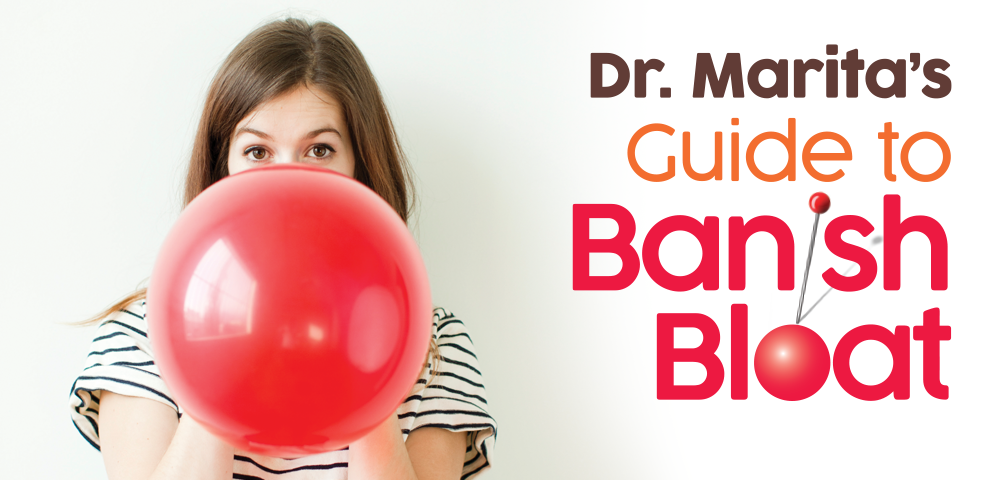
Now that you’ve reached your forties and beyond, do you ever feel like you’ve swallowed a whole watermelon after a meal? You’re not alone.
The dreaded “food baby bloat” is a common occurrence, and while some stomach expansion after a meal is normal, bloating twice the size of your stomach indicates issues with your digestive health. Thankfully, there are ways to tame the bloating beast and reclaim your comfort and confidence.
THE FLAT STOMACH MYTH
First, let’s dispel the myth of a totally flat stomach. Many women will never have a completely flat stomach no matter what diet or exercise plan they follow simply because of the anatomy of their reproductive organs. The “pouch” at the bottom of your stomach serves the important purpose of protecting your womb and ovaries. Some individuals have an anatomy that supports washboard abs, but no one’s stomach is flat 100% of the time. It’s 100% normal for the belly to expand after eating, simply because of the extra volume inside the body and the normal gasses produced during digestion.
RECOGNIZING ABNORMAL BLOATING
That being said, the “food baby bloat” is a different story. This condition refers to excessive and uncomfortable bloating (gas production) after eating and can indicate gut health and digestion issues.
Keep an eye out for symptoms like abdominal pain, changes in bowel habits like constipation or diarrhea, or unexplained weight loss, which may warrant a visit to your health care practitioner.
GUIDE TO BEATING THE BLOAT
GUT-SUPPORTIVE DIET
Certain foods, such as processed foods, excessive salt, and carbonated beverages, trigger bloating. Instead, opt for whole foods like fruits, vegetables, meats, nuts, and whole grains. Be mindful of food sensitivities, such as dairy, eggs, soy, legumes, or gluten. Some people tolerate these foods well, and others do not. Keep a food diary, notice what foods trigger bloating, and try to avoid them. Probiotic-rich foods like yogurt, kefir, miso, and sauerkraut are great additions to your diet to promote a healthy gut microbiome.
THE POWER OF PROBIOTICS
Probiotics are live bacteria and yeasts that offer numerous gut health benefits, including improved digestion and reduced bloating. The probiotic foods listed above are great dietary additions, but many people also benefit from a good probiotic supplement to help their microbiome flourish. Travel Biotic™ is my favorite blend, and it is convenient for busy lifestyles as it doesn’t require refrigeration like other probiotic supplements. You can take it with you to work, school, or travel.
SOOTHING SOLUTIONS
When bloating strikes, it can be hard to know how to alleviate the discomfort. Ginger, papaya, and cinnamon are great allies in reducing bloating. Teas like peppermint and chamomile can help soothe the digestive tract and ease bloating. On the go, I love Natural Factors’ ginger chews and papaya enzyme supplements. They are delicious and effective at supporting gut comfort while aiding good digestion.
WHAT ELSE CAN HELP?
- Remember to chew with your mouth closed and skip the gum. Open-mouthed chewing leads to swallowing more air and creates more digestive gas.
- Go for a “fart walk.” Incorporating more physical activity into your routine, particularly after a meal, helps aid digestion.
- Don’t overeat. Lighten your body’s digestive load by opting for smaller, more frequent meals and snacks throughout the day.
Don’t let food baby bloat ruin your life. Take control of your digestive health today. By making a few simple dietary adjustments, you can savor your meals without the burden of feeling miserable afterwards.
Processed foods, overeating or eating too quickly, stress, certain medications, menstrual cycle stages, or insufficient fiber or water intake can all be factors in bloating. There are also medical conditions that might lead to bloating, including irritable bowel syndrome (IBS) and irritable bowel disease (IBD), gastroesophageal reflux disease (GERD), celiac disease, and food sensitivities. More severe health issues could cause abdominal bloating, such as ovarian cysts, uterine fibroids, and inflammation of the liver, spleen, kidneys, or lymph nodes.












